Bridging the Gap Between Science and Society to Foster a Greater Understanding of the Climate Crisis
It’s often said that the definition of insanity is doing the same thing over and over again and expecting different results. When it comes to the climate crisis, everyone preaches the existential threat of climate change, yet society continues to carry on as they have since the dawn of the Industrial Revolution. Based on the above definition, humanity is seemingly displaying characteristics of insanity. So, why are we not reducing our emissions, the obvious contributor to a warming atmosphere? Why are they in fact still increasing? Are we evil? No, of course not. People continue doing what they do because the vast majority don’t have a clue about the actual consequences of our everyday habits, and they are unaware of the fact that rapid change is required. If there really was a crisis, and if this crisis was caused by humans’ emissions, one would expect tangible evidence . . . or at least some restrictions. But the fact of the matter is there are no emergency meetings, no headlines, no breaking news. No one is acting as if we are in a crisis. Even most climate scientists and green politicians continue to fly around the world and consume meat and dairy products, myself included.
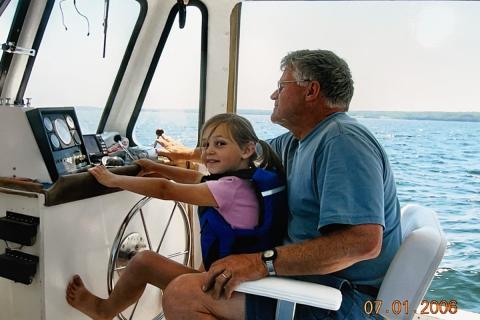
The author and her grandfather, Terrance (Terry) Gray.
I began studying the Gulf of Maine’s rocky intertidal zone long before I fully understood that climate change is altering ecosystems to a point where marine health and resources have become severely impacted. I spent my childhood lobstering the coast of Maine, hauling five recreational traps each summer, quickly learning the tricks of the trade and growing comfortable operating boats in and out of Blue Hill Bay. Lobsters were plentiful, the commercial fishermen teemed with energy and success, and I happily fished in their shadows. I liked the dirty work that came with lobstering; my grandpa taught me to stuff bait bags with the mackerel that I would catch off the docks. My sisters would wrinkle their noses at the fish gut odor, but I didn’t mind.
My coastal upbringing sparked a passion for oceanographic research. You may be familiar with the term ignorance is bliss, and for me and presumably many of my fellow fishermen and women—it was. Strictly looking at the benefit of harvesting lobster populations, whether it was economic gain or simple pleasure, there was no need for change at that time. The supply was meeting the demand, and that was enough. However, when I chose to continue my education at the University of New Hampshire (UNH), each course began to chip away at this shield of ignorance… so maybe the adjective to use is not insanity but ignorance to describe the nature of humans’ seemingly lackadaisical efforts to recognize and act on today’s climate crisis.
Reading and writing about scientific research takes a vast amount of energy and time, and it takes a certain degree of passion to extract the importance of a publication’s message, which is easily lost because of the complex language in which it is presented. What is tricky is that this language evolves over long periods of time, not just by memorization but through experiences and coursework, something so immersive but so tailored to the scientific community that it creates an invisible divide. The goal of this commentary is to work toward bridging this gap between science and society, acknowledging the importance of general understanding between both parties in order to work together in the coming years of Earth’s climate crisis.
Learning the Language of Science
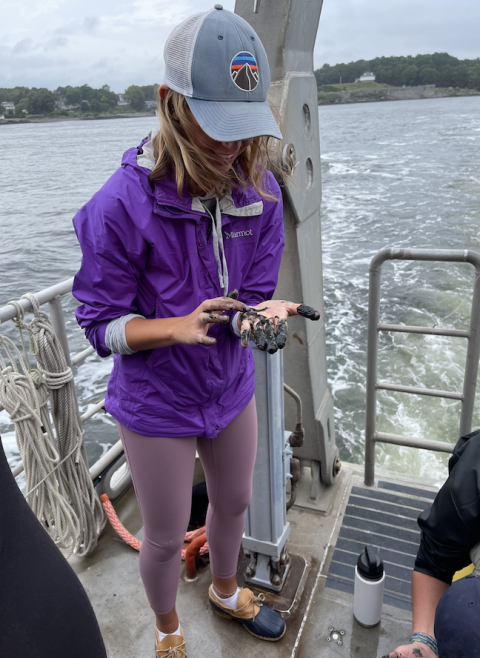
The author aboard UNH's R/V Gulf Challenger just outside of the Judd Gregg Marine Research Complex in New Castle, NH. Photo credit: Sophie Alpert.
I began research at UNH as a marine biologist, interested in the ocean’s inhabitants and the interactions among them and their environment. After spending a year working in a marine invertebrate species laboratory, I realized I was much more interested in the marine environment itself and the subsequent effects it had on its inhabitants. So, I became involved as a research assistant in Dr. Robert Letscher’s laboratory, studying the Gulf of Maine and the effect of its rising surface temperatures on nutrient remineralization and subsequent biological productivity.
The Gulf of Maine steadily receives warm water via Atlantic circulation up the Gulf Stream. At the same time, it has historically received cold, northern polar waters from the Labrador Current. Recently scientists have discovered what we like to call the “bathtub effect,” where it appears as though the “warm tap” of the bathtub is left running while the “cold tap” is slowly being turned down. Because of the melting of the Greenland ice sheet in today’s rapidly warming climate, oceanic water circulations are becoming skewed, and the East Coast of North America is one of the highly affected regions experiencing sea surface temperature increases. These surface waters serve as the only habitat for phytoplankton to flourish, because much like terrestrial plants, phytoplankton require adequate levels of sunlight to conduct photosynthesis, taking in carbon dioxide (CO2) and producing oxygen (O2). Therefore, biologically productive surface waters work to decrease atmospheric CO2 and increase O2 concentrations, fueling the rest of the biotic community—including us humans!
In 2015, Andrew Pershing, a scientist at the Gulf of Maine Research Institution, published data suggesting our home waters of the Gulf of Maine are warming faster than 99% of the rest of the world’s oceans (Figure 1). It was this paper, introduced to me by Dr. Letscher himself shortly after I joined his lab, that sparked my dedication to undergraduate research studying how this dramatic increase in temperature conditions will impact not just the biology of my home waters but the economic stability as well. With dwindling primary production (energy provided by photosynthesizing organisms) comes starvation up the food chain, one that we rely heavily on economically.
In May 2018, Dr. Letscher and members of his lab collected seawater samples aboard the UNH R/V Gulf Challenge off the coast of the Isle of Shoals. A sampler was deployed to collect a series of water samples to create a snapshot of the vertical water column. Samples were stored back at the campus laboratory under incubation systems, one of which mimics current temperature conditions, and the other was set to projected future temperatures. The purpose of this was to assess the ability of secondary production (by microbial bacteria) to regenerate inorganic nutrients to fuel primary producers.
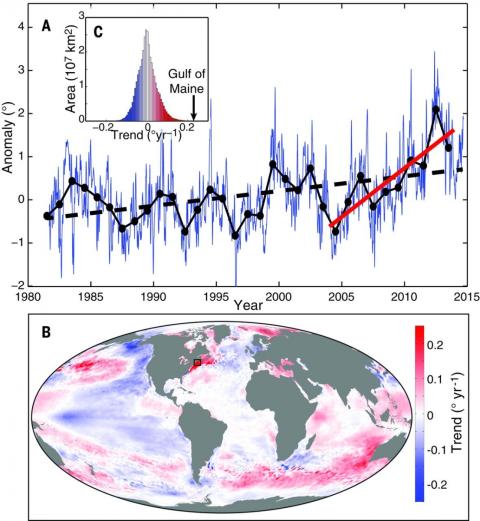
Figure 1: Sea surface temperature trends from the Gulf of Maine and the global ocean. (A) Daily (blue) and annual (black dots) sea surface temperature anomalies from 1982 to 2013, depicting long-term trend (black dashed line) and the increasing temperature trend over recent decade (2004 - 2013) indicated by the red solid line. (B) Global sea surface trends (2004 - 2013) where the Gulf of Maine is outlined by the black box. The dark red color within this regional box indicates the Gulf of Maine is warming significantly more than other global regions. C) Histogram of global 2004 - 2013 sea surface trends with the Gulf of Maine trend indicated at the right extreme of the distribution. (Pershing, 2015)
Along with sunlight, photosynthetic organisms like phytoplankton require nutrients to grow, particularly nitrate (NO3) and phosphate (PO4). Phytoplankton consume these inorganic nutrients and excrete them as organic matter, which is then utilized as a form of energy by microbes. These microbes in turn excrete NO3 and PO4 back into the water column in a form that can be used by phytoplankton to fuel primary production. In the lab, I measured NO3 and PO4 concentrations in the samples to see how they varied in different temperature conditions.
Preliminary findings from these samples suggested a startling decline in overall biological productivity in the Gulf of Maine as indicated by lower inorganic nutrient concentration measurements within the warmer temperature incubation experiment. At the time, I was eager to build from the momentum that I had gained from this work. It felt real and powerful, as if I was discovering for myself raw data that proved this global warming beast wasn’t some fictional character. Research takes time and patience, not simply doing the work in the field but interpreting those results and deciding how to communicate your findings. As a young undergraduate, I was excited to continue this project. However, the nature of the pandemic limited in-person field and laboratory research, so I decided to take a different approach to studying the impact of today’s climate crisis on marine ecosystems. I was not naïve to the fact that my home coastline was only one small region of the global ocean experiencing this decline in environmental stability, so I began to explore the world of oceanographic modeling where I could simulate Earth’s past, present, and future climate states, and observe their correlations to biological productivity.
The focus of my senior thesis began as I worked with online databases to visualize global trends in biogeochemical processes that I had been measuring in a laboratory setting up until that point. This was a great way to use what I had the opportunity to study in person and apply it to a broader picture, exploring warming regions on a global scale and using historic data to diagnose trends in productivity over the past two decades. There are more ways of visualizing data than I could have imagined, and by beginning to explore the language of coding, I was able to understand how to incorporate interdisciplinary themes into research. During a time of isolation, I found connection through working with models and data sets that researchers across the world were actively working with as well.
I wanted to test the widely held prediction that a future warmer oceanic water column will contain fewer available nutrients and cause a decrease in biological productivity. I aimed to explore both the warming and cooling regions (Figure 2) of the global ocean to assess these trends in productivity with time. Similar to what I’d discovered about the Gulf of Maine, I found corroborating evidence for a decrease in productivity with increasing sea surface temperatures, and furthermore, increasing productivity with decreasing temperatures. (You may learn more about this research in the fall 2021 issue of Inquiry.)
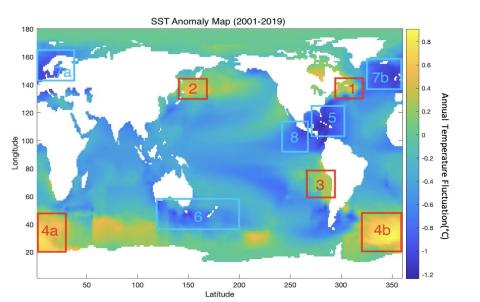
Figure 2: A sea surface temperature anomaly map I created to identify eight major warming (red) and cooling (blue) regions of the global ocean (see Table 1). Temperature changes fluctuated from +1°C to -1.2°C annually in relation to the historical average temperature for any given location.
So . . . now what?
If the Gulf of Maine is really warming faster than 99% of the rest of the world’s oceans, are the coastal shores I grew up learning to love some of the first to experience these changes? What does that mean for lobster? What does that mean for my family members and friends whose livelihoods depend on the health and stability of the fishing industry? What does that mean for my home state’s economy? I often think of the day I have children or grandchildren. Maybe they will ask me about us, the people who were around in the early 2000s, and ask, “Why didn’t you do anything while there was still time?”
I don’t believe earth and environmental science is communicated well enough. It is daunting, complex, and seemingly incredibly controversial, because sometimes the world’s most intelligent scientists lack the social skills necessary to effectively communicate their findings with the public. I too have fallen victim to portraying myself as condescending when attempting to explain climate change. But the simple fact of the matter is that it should not be controversial. It should not be political. Climate change is happening on unprecedented time scales, and our society is spending so much energy dividing into groups of who is right and who is wrong that there is no room for growth. A major lesson I have learned as a researcher is that in science there is no right or wrong. There are theories, there is data to support theories, and that is what we must work with to move forward.
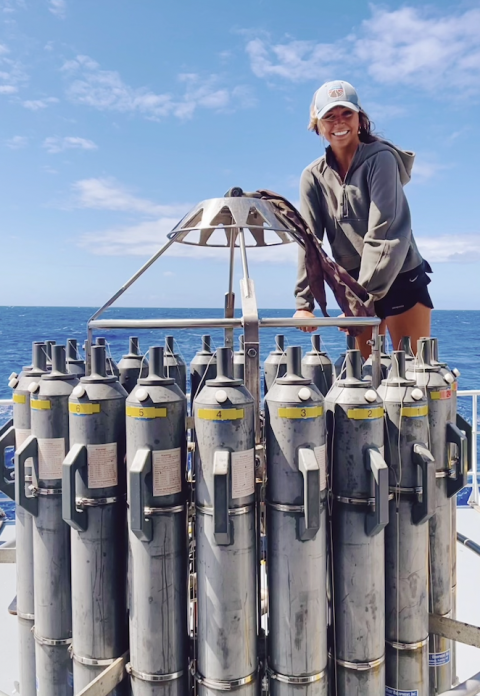
The author sampling in Hawaii.
Today I am working toward obtaining a master of science degree in chemical oceanography at UNH. I participated in a research cruise off the shores of Oahu, in Hawaii, collecting samples to study the cycling of nutrients in the subtropical region of the world’s oceans. In the era of global warming, the subtropics are predicted to expand rapidly toward the poles, thus highlighting the importance of understanding current subtropical oceanography. I am continuing to assess the cycling of nutrients between primary and secondary producers, observing nutrient distributions in the water column, as well as phytoplankton biogeography trends.
My hope is for the general public to hear of the climate crisis and feel something: anger, sadness, frustration, worry, or even acceptance that climate change is real. We will observe many impacts of climate change during our own lifetime. (Just think about lobster populations and subsequent market prices today compared with decades ago!) We still have the luxury of tasting a fresh buttery Maine lobster roll at the beach in the summer, but climate change is morbidly sneaky. As sea surface temperatures rise and reduce the biological productivity of global fishery stocks, resource managers will face difficult decisions regarding the sustainability and conservation of their species. These decisions will likely further disrupt the dwindling harmony between commercial fishermen and research scientists. Therefore, effective communication and interdisciplinary relationships among scientists, policy makers, economists, and industry professionals are of utmost importance to combat climate change while balancing economic feasibility.
There is still time.
I would like to sincerely thank Dr. Robert Letscher for his guidance as a mentor and adviser during my time at UNH. My research would not have been possible without his patience and willingness to train me as a research assistant, especially during this time of COVID-19 uncertainty. It was because of his creativity and flexibility that I was able to complete research outside of the laboratory. This work was partially supported by a student grant from the Hamel Center for Undergraduate Research, whom I would also like to thank for their support in providing the adequate technologies to conduct my research and for helping me through the process of effectively sharing my scientific studies with the general public.
References
Pershing et al. 2015. Slow adaptation in the face of rapid warming leads to collapse of the Gulf of Maine cod fishery. Science, 350(6262), 809–812.
Author and Mentor Bios
Jessica Gray, from Freeport, Maine, graduated from the University of New Hampshire in May 2021 with a bachelor of science degree in earth sciences and is a current graduate student working on a master’s degree in oceanography. She began research at UNH as a marine biologist, interested in the ocean's inhabitants and the interactions among them and their environment, but soon realized she was much more interested in the environment itself and its subsequent effect on its inhabitants. She began working in Dr. Letscher’s lab in order to pursue this new interest. With the pandemic limiting in-person field and laboratory research, she dipped her toes into the world of oceanographic modeling and began working with online databases to visualize global trends in these processes. She explains, “I learned about the beauty of modeling and complexity which goes into data extraction and resolution.” Jessica strongly believes in the importance of bridging scientific knowledge with public policy and aspires to enhance the general public's understanding of their environment. Writing for Inquiry has provided the opportunity to step away from writing for and talking with experts in her field and explore effective ways to communicate with society. She plans to use these skills to work as a liaison for oceanography and our future society.
Robert Letscher is an assistant professor in the Department of Earth Sciences at the University of New Hampshire, College of Engineering and Physical Sciences. Dr. Letscher studies ocean nutrient biogeochemistry; his research focuses on understanding the production, transformation, and fate of biologically produced organic matter and the related cycling of chemical nutrients in the sea.
Copyright 2022, Jessica Gray
